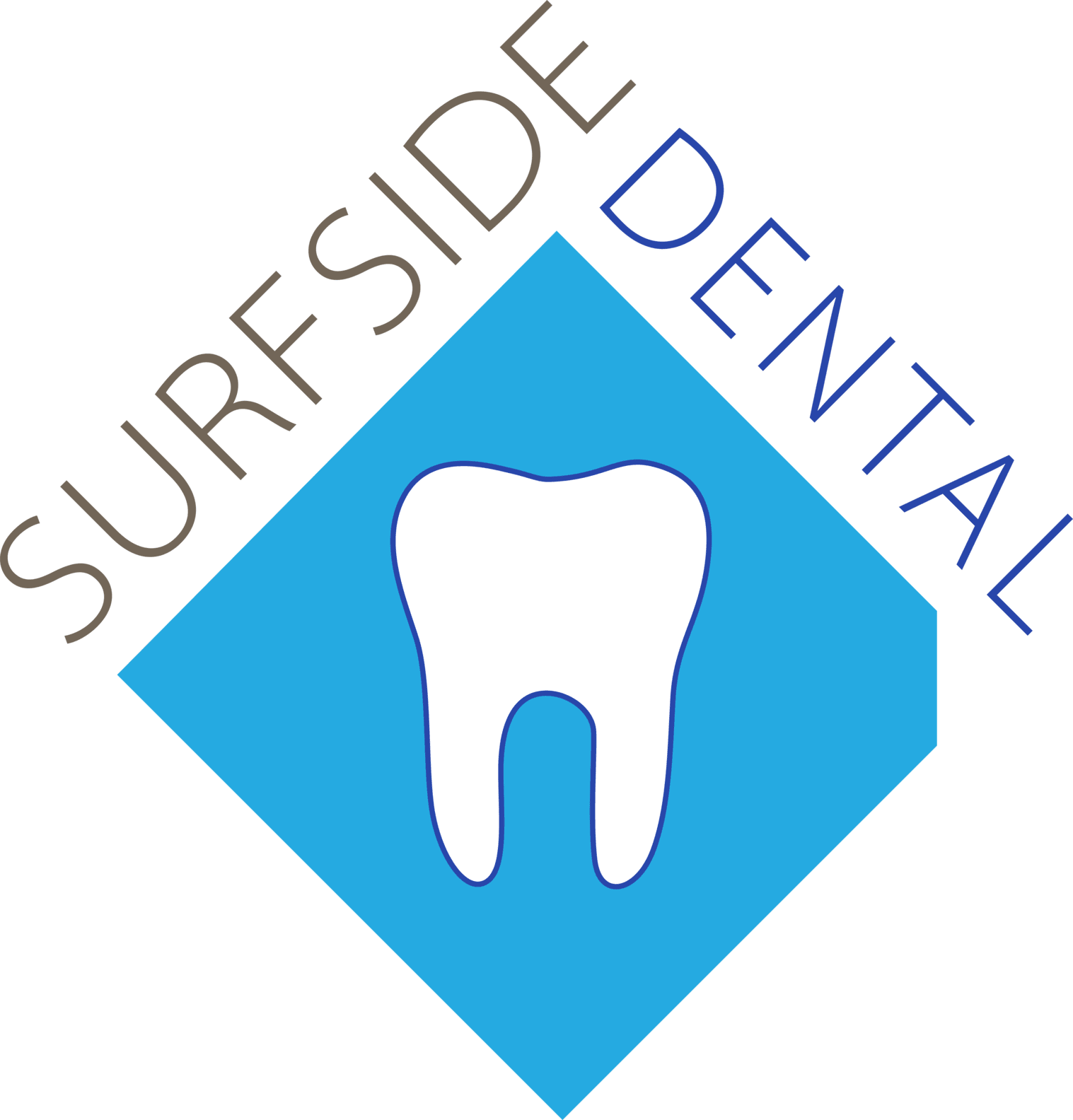Dental Abscesses: What You Need to Know

Source: Dr. Marketing
A dental abscess is a serious condition caused by a bacterial infection that results in a pocket of pus forming in or around a tooth. While it may start as a mild discomfort, an untreated dental abscess can escalate quickly, leading to significant pain and potential complications that affect both oral and overall health.
At Surfside Dental, we prioritize educating our patients about dental conditions like abscesses. This blog provides an in-depth understanding of dental abscesses, including their causes, symptoms, treatment options, and prevention strategies to help you maintain optimal oral health.
What Is a Dental Abscess?

A dental abscess is a localized infection in the mouth that occurs when bacteria invade the soft tissues, leading to inflammation, swelling, and pus buildup. This condition is often painful and requires prompt treatment to prevent complications such as the spread of infection to other areas of the body. Abscesses can form for various reasons, including untreated cavities, gum disease, or trauma to the teeth and gums. While symptoms can range from mild discomfort to severe pain, common signs include swelling, redness, fever, and a persistent bad taste in the mouth. Seeking dental care as soon as possible is crucial to address the infection and relieve discomfort.
Types of Dental Abscesses
Dental abscesses are classified based on their location and underlying cause. The three primary types include:
- Periapical Abscess – This type of abscess forms at the tip of a tooth’s root when bacteria enter the inner pulp, often due to deep cavities, fractures, or trauma. The infection spreads through the root canals, leading to pus accumulation and pressure that can cause severe pain. If left untreated, the infection can extend into surrounding bone and tissues, requiring root canal therapy or, in severe cases, tooth extraction.
- Periodontal Abscess – This abscess develops in the gum tissue near a tooth root, typically due to advanced gum disease (periodontitis). It occurs when bacteria become trapped in deep gum pockets, leading to swelling, tenderness, and potential damage to the surrounding bone structure. Periodontal abscesses can cause gum recession and tooth mobility if not treated with deep cleaning, drainage, and sometimes antibiotics.
- Gingival Abscess – Unlike periapical and periodontal abscesses, a gingival abscess is limited to the gum tissue and does not affect the tooth or supporting structures. It is usually triggered by a foreign object, such as a popcorn kernel or food particle, getting lodged in the gums, leading to localized irritation and infection. While this type of abscess is generally less severe, it can still cause discomfort and should be treated to prevent further infection.
Understanding the type of abscess is key to determining the appropriate treatment plan.
Causes of Dental Abscesses
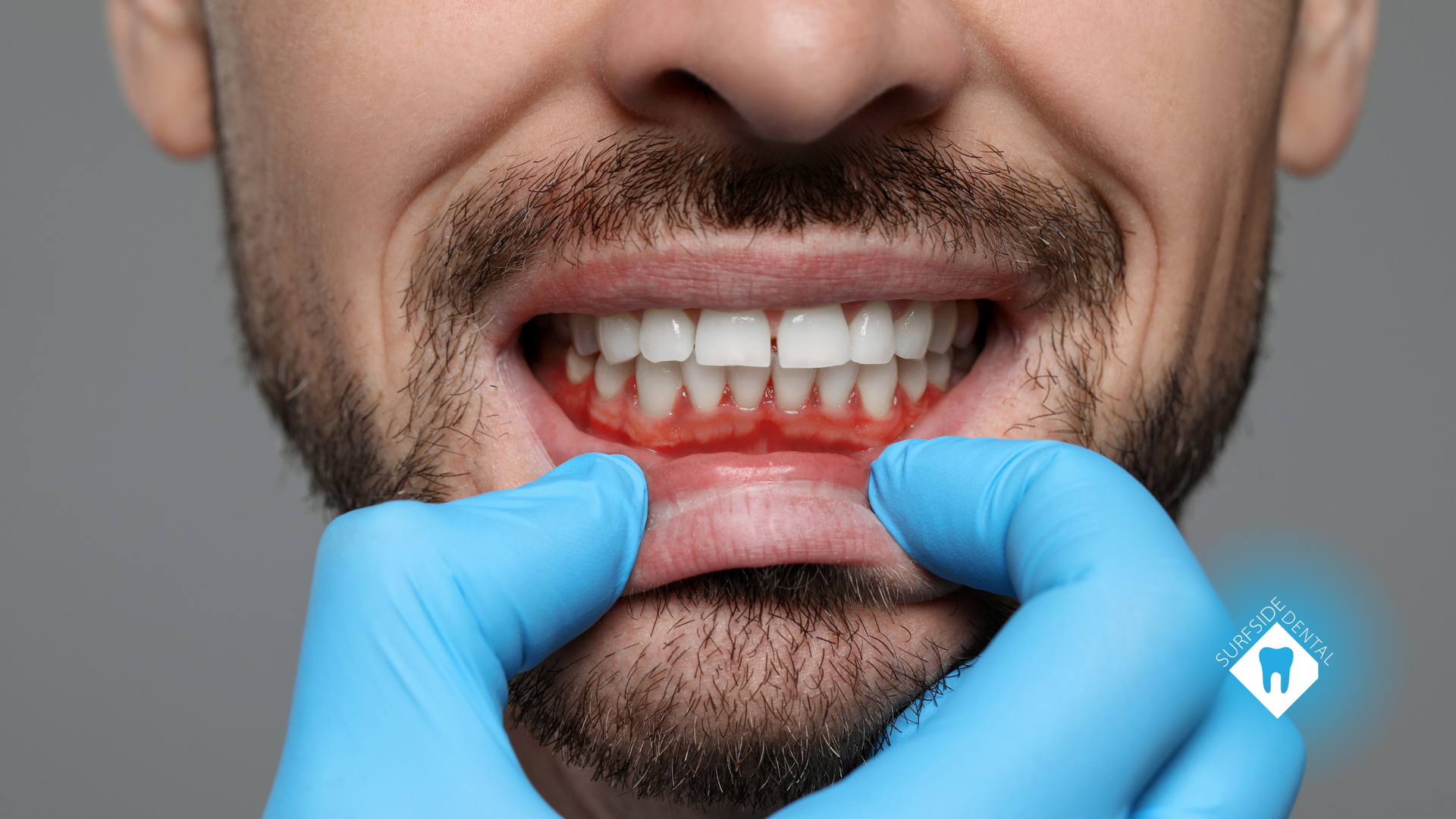
A dental abscess forms when harmful bacteria enter the soft tissue through damaged enamel, gums, or tooth roots. Common causes include:
- Untreated Tooth Decay: Cavities that go untreated provide an entry point for bacteria to reach the tooth’s inner pulp, causing infection.
- Gum Disease: Periodontitis can lead to deep pockets in the gums, which trap bacteria and create an environment for infection.
- Dental Trauma: Cracks, chips, or injuries to a tooth can expose the pulp to bacteria.
- Poor Oral Hygiene: Inadequate brushing and flossing can lead to plaque buildup, decay, and infection.
- Foreign Objects: Small particles like food debris or foreign bodies lodged in the gums can cause localized infection.
At Surfside Dental, we believe understanding these causes can empower patients to take preventive measures and reduce their risk of developing a dental abscess.
Symptoms of a Dental Abscess

A dental abscess can cause a variety of symptoms, ranging from mild discomfort to severe pain. Recognizing these signs early can help you seek timely treatment:
- Throbbing Pain: Persistent, intense pain that often radiates to the jaw, neck, or ear is a hallmark symptom.
- Swelling and Redness: The gums or face near the infected tooth may swell and appear red or tender.
- Tooth Sensitivity: Abscessed teeth may become highly sensitive to hot, cold, or pressure.
- Bad Taste or Smell: Pus drainage can lead to an unpleasant taste or foul odor in the mouth.
- Fever and Fatigue: If the infection spreads, systemic symptoms like fever and fatigue may occur.
- Difficulty Chewing or Swallowing: Severe abscesses can cause discomfort during basic functions like eating or speaking.
If you experience any of these symptoms, it is crucial to seek professional dental care immediately.
Diagnosing a Dental Abscess
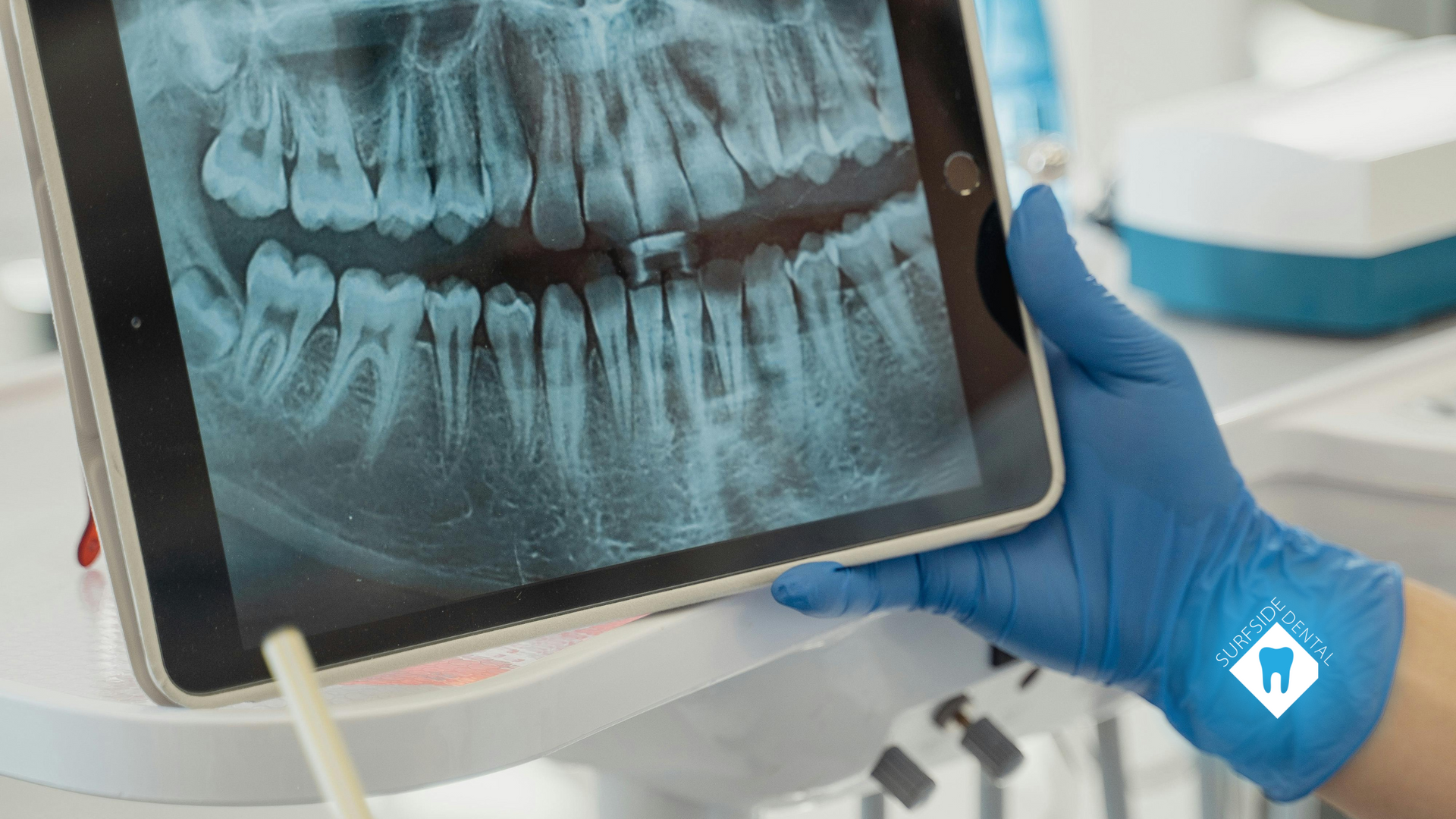
At Surfside Dental, we use a combination of methods to diagnose dental abscesses accurately:
- Physical Examination: We check for visible signs of infection, such as swelling, redness, or pus drainage.
- X-Rays: Dental X-rays help identify the location and extent of the infection, including any damage to surrounding bone or tissues.
- Sensitivity Testing: Assessing the tooth’s response to pressure or temperature helps pinpoint the affected area.
Accurate diagnosis is the first step in developing an effective treatment plan.
Treatment Options for a Dental Abscess
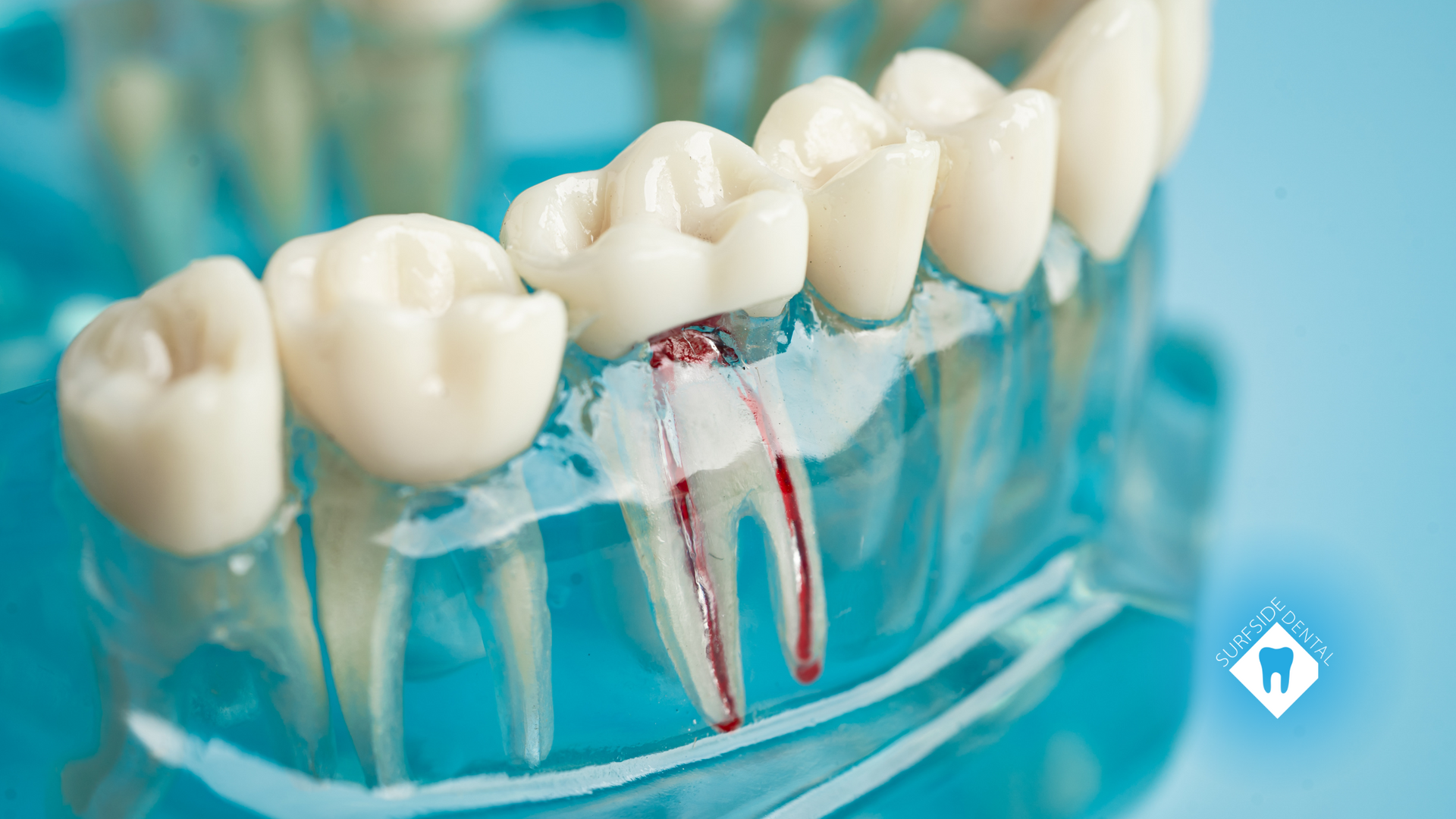
Treating a dental abscess involves eliminating the infection, relieving pain, and addressing any underlying causes. Here are the most common treatment options:
- Draining the Abscess: Your dentist may make a small incision to drain the pus, which relieves pressure and reduces pain. This procedure is often the first step in managing a dental abscess.
- Root Canal Therapy: For abscesses affecting the tooth’s pulp, a root canal may be performed. This involves removing the infected pulp, cleaning the tooth’s interior, and sealing it to prevent further infection. Root canals can often save the tooth from extraction.
- Tooth Extraction: If the tooth is severely damaged or the infection is too extensive, it may need to be removed to stop the spread of bacteria.
- Antibiotics: In cases where the infection has spread or is causing systemic symptoms, antibiotics may be prescribed to control bacterial growth.
- Pain Management: Over-the-counter pain relievers or prescribed medications can help alleviate discomfort while the infection is being treated.
At Surfside Dental, we offer comprehensive care for dental abscesses and other oral health concerns. Our services include:
- Advanced Diagnostics: We use latest technology to identify the root cause of your abscess.
- Effective Treatment Plans: From drainage to root canal therapy, our team provides solutions tailored to your needs.
- Preventive Education: We guide you on maintaining oral hygiene practices that reduce your risk of future infections.
With compassionate care and a focus on your well-being, we ensure that you receive the treatment and support needed for lasting oral health.
Complications of Untreated Dental Abscesses

A dental abscess is not just a localized oral issue—it can lead to significant complications that affect both your oral health and overall well-being. Ignoring the signs of an abscess allows the infection to progress, potentially causing serious and sometimes life-threatening problems. Here is a closer look at the possible consequences:
Tooth Loss
When left untreated, the infection caused by a dental abscess can destroy the tooth and surrounding tissues. The bacteria attack the tooth’s pulp, leading to severe decay and structural weakening. As the infection spreads, the tooth may become loose and ultimately require extraction. Losing a tooth not only affects your appearance but can also lead to problems like difficulty chewing, changes in speech, and shifting of surrounding teeth.
Bone Damage
The infection from a dental abscess can extend beyond the tooth and into the jawbone. This can result in bone loss, which weakens the jaw’s structure and makes it more difficult to support teeth or dental restorations like implants. Over time, untreated bone damage can lead to facial changes, reduced bite strength, and difficulty with dental prosthetics. Addressing the abscess early prevents the bacteria from reaching and damaging the bone.
Systemic Infections
One of the most serious risks of an untreated dental abscess is the spread of bacteria into the bloodstream. Once bacteria enter the circulatory system, they can travel to other parts of the body, potentially causing sepsis—a life-threatening condition characterized by widespread inflammation and organ failure. Systemic infections can also affect the heart (endocarditis) or lungs, making prompt dental care essential to protect overall health.
Sinus Infections
For abscesses in the upper jaw, the infection can spread to the sinuses, causing sinusitis. This condition may result in symptoms like facial pressure, nasal congestion, headaches, and fever. Chronic sinus infections caused by dental abscesses can significantly impact your quality of life and may require both dental and medical treatment to resolve fully.
Preventing Dental Abscesses
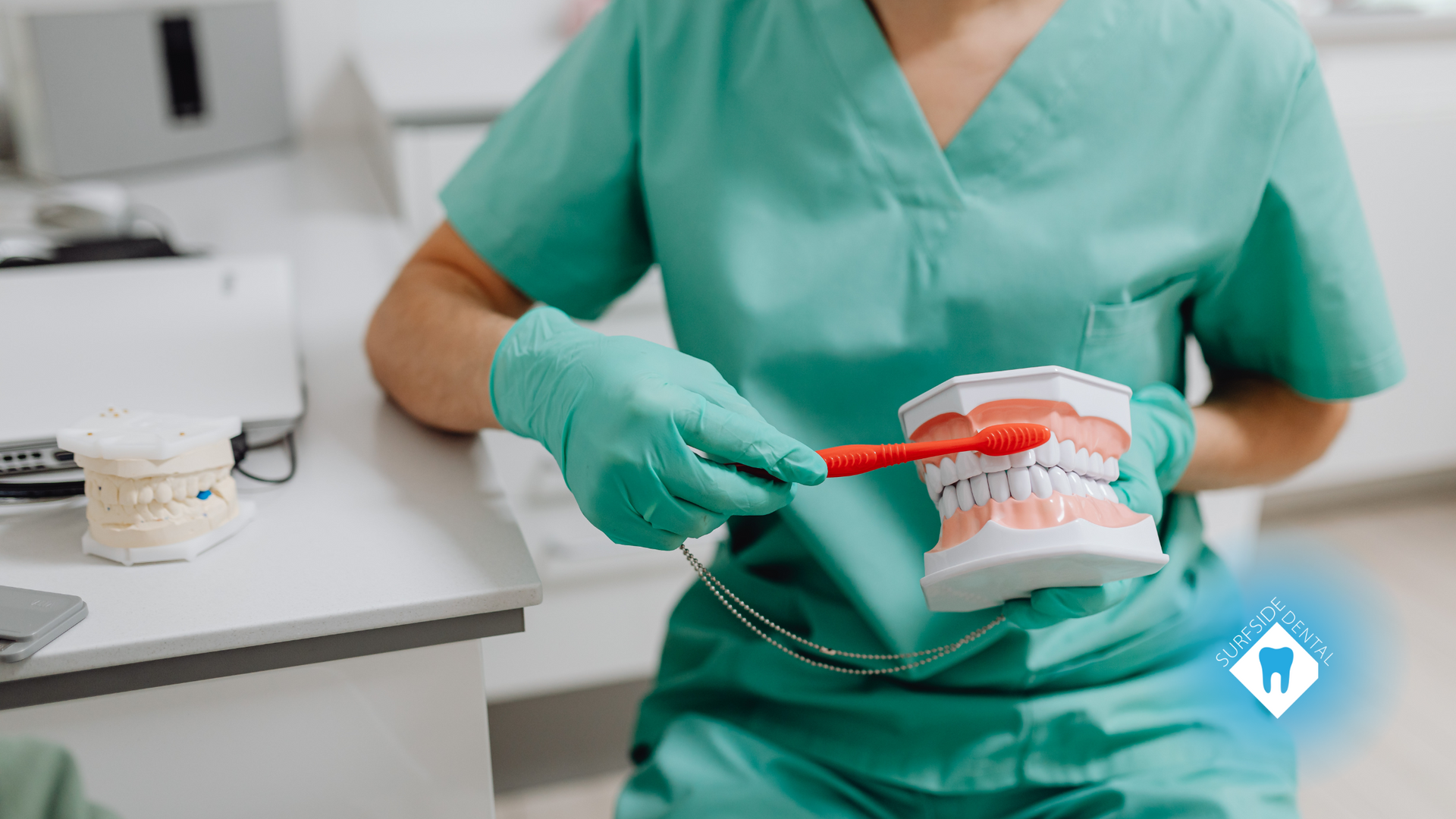
Prevention is the best strategy for avoiding the pain and risks associated with a dental abscess. Here is how you can protect your oral health:
- Maintain Good Oral Hygiene: Brush twice a day, floss daily, and use an antibacterial mouthwash to reduce plaque buildup.
- Visit Your Dentist Regularly: Routine checkups allow your dentist to catch and address potential issues early.
- Treat Cavities Promptly: Do not delay filling cavities or repairing damaged teeth.
- Avoid Tobacco: Smoking increases the risk of gum disease and oral infections.
- Eat a Healthy Diet: Reduce sugary foods and drinks, which can contribute to decay, and opt for nutrient-rich options that support gum and tooth health.
At Surfside Dental, we emphasize preventive care to help you maintain a healthy mouth and reduce the risk of dental abscesses.
Protecting Your Smile and Health

A dental abscess is a painful and potentially dangerous condition that should never be ignored. By understanding its causes, recognizing the symptoms, and seeking prompt treatment, you can protect your oral health and overall well-being.
At Surfside Dental in Fort Myers and Cape Coral,, we are committed to helping you achieve a healthy, pain-free smile. Whether you need treatment for a dental abscess or want to learn more about preventing future issues, our team is here to help. Schedule your appointment today and take the first step toward a healthier smile and a healthier you.



